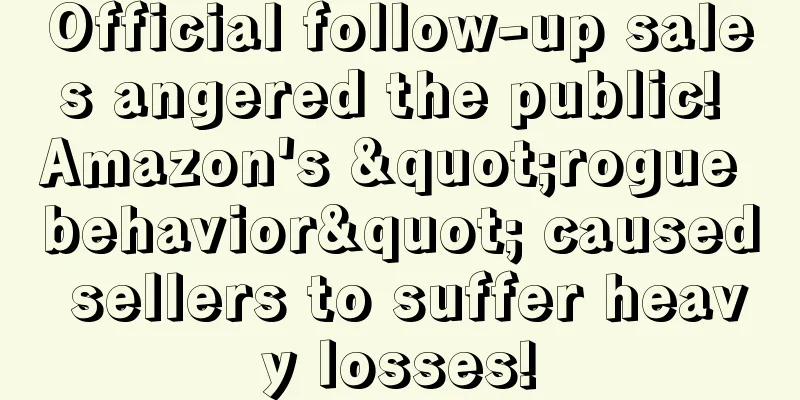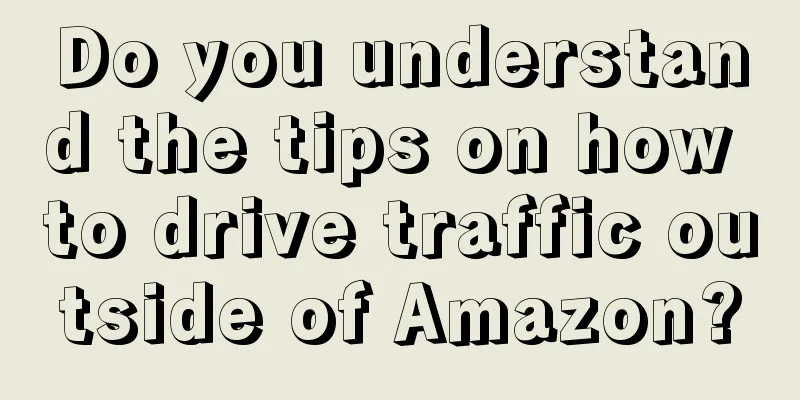|
According to eMarketer's 2021 forecast, Amazon's e-commerce sales are expected to exceed $367 billion in 2021. Such dazzling data is enough for Amazon to gain a foothold in the global e-commerce market, but its ambitions go beyond that. In addition to aggressively entering more potential countries, Amazon also intends to expand the territory of its own brands. It is learned that Amazon recently launched a new private food brand, and this latest initiative can be described as a "king bomb" among its grocery competitors. However, in the eyes of sellers, Amazon's self-operated business is a role that is both a referee and a contestant. Because it constantly touches third-party sellers and uses various means to engage in unfair competition with sellers, sellers have a love-hate relationship with Amazon. However, in front of the platform, even if the sellers are right, they can only suffer in silence. For example, many sellers suffer in silence when Amazon's own sales copycats them. Seller's product is suspended after being copied by Amazon In fact, it is not new for Amazon to follow third-party sellers. Previously, there have been cases where sellers’ product links were followed by Amazon. Most sellers also believe that they can only accept it if they are followed by official sellers, and there is no good solution. Recently, in the seller communication group, many sellers reported that their products were copied by Amazon, and this time, Amazon’s own copy-selling behavior was even more "arrogant." A seller reported that his product was copied and sold by Amazon from the US site to the Australian site. Because the product was not the same as the one described , the link received many negative reviews , and finally the seller’s link to the US site was suspended . ▲ The picture comes from the seller communication group It is understood that the seller's product link has been operating for a long time and could originally place dozens of orders a day . However, due to Amazon's copy-selling action, the product was completely discontinued. ▲ The picture comes from the seller communication group Coincidentally, another seller also reported that the link to the European site of the store was also followed by Amazon’s own sales. In response, a seller joked: Being targeted by Amazon means that this listing is very good However, more sellers are disgusted by Amazon's self-operated behavior and have accused Amazon of being "shameless": official follow-up sales are the most deadly! ▲ The picture comes from the seller communication group In addition, on the seller forum, some sellers encountered the same problem: during the period when the product was out of stock, the link was copied by Amazon and received two one-star bad reviews , and then the seller's product was discontinued . ▲ The picture comes from Zhiwubuyan According to the investigation, it was found that there were quite a few sellers who were copied by Amazon's own sales, and their experiences were similar. After being copied, the product links were either discontinued due to too many complaints or the sales volume dropped and the traffic disappeared. ▲ The picture comes from the seller communication group It is difficult for sellers to compete with Amazon’s self-operated products on their own. Therefore, whenever sellers are copied by Amazon’s self-operated products, they will lose miserably. However, the competition between Amazon and third-party sellers has never stopped. In order to seize the traffic of third-party sellers, Amazon has tried every possible means. What other "rogue behaviors" does Amazon have?As Amazon's "mother family", Amazon's own brands have incomparable inherent advantages: Amazon’s own operations eliminate delivery fees and commissions, so costs are extremely low. Amazon can easily access buyer data, understand buyer psychology, and develop competitive products. The Amazon brand has its own halo and can easily gain the trust of users.
▲ The picture comes from the seller communication group With the protection of the Amazon platform, Amazon can do whatever it wants. In addition to copying third-party sellers and vigorously promoting its own brands, Amazon also seizes third-party sellers' traffic by blocking sellers' traffic, increasing advertising costs, and registering trademarks and patents. ▲ The picture comes from the seller communication group According to sellers, once Amazon sees a product selling well, it will work directly with the brand to follow the seller's lead and sell the product without the seller's knowledge. ▲ The picture comes from the seller communication group There is also feedback from sellers: In the second half of last year, Amazon stopped selling several of my products on the grounds that the products were hot-selling items. Then the link was taken away by Amazon officials for sale. It took nearly a month to get it back, and the inventory was almost sold out by Amazon. For the smart home doorbell product that was very popular last year, Amazon directly stipulated that the keyword "smart doorbell" could not be placed, and blocked all advertisements from third-party sellers, causing sellers in this category to be completely eliminated and abandon this product. ▲ The picture comes from the seller communication group All these actions show that Amazon is sometimes jealous of sellers. As long as someone's product becomes a hot-selling item on Amazon, there is a possibility of being maliciously attacked by Amazon's own brand. These measures have also successfully improved the performance of Amazon's own brands, making them a dominant force in sales of key categories. It is learned that during Prime Day 2020, Amazon's own brand sales soared, with GMV share increasing from 40% to nearly 70%, while third-party sellers' sales share dropped from 60% to less than 35%. On the one hand, the performance of Amazon's own brands continues to rise, while on the other hand, the interests of third-party sellers continue to be damaged. Under such a strong contrast, more and more sellers have come forward to denounce Amazon, but the tragic situation of "only Amazon laughing, but no sellers crying" has emerged. What should I do if my product is copied by Amazon? So when sellers encounter Amazon's copycat sales, do they really have no chance to fight back? The answer is not so. Although Amazon's self-operated business is very powerful, some sellers have summarized effective ways to prevent Amazon's copycat sales: 1. Open the Amazon backend - find the Amazon logistics interface - click "Allow Amazon to buy my inventory" - set to disable all. 2. Sellers with brand registration can try to complain to customer service. 3. Find a service provider to provide services to prevent follow-up sales or to register BrandGating for permanent anti-follow-sale authorization. In addition, sellers can also prevent Amazon’s malicious competition and copycat sales through the following methods: 1. If you find that your product is being copied, please contact customer service as soon as possible and provide valid materials. 2. Build a good brand website and declare brand ownership. 3. Adhere to quality and standards to ensure that products have high praise rate and reasonable prices. 4. Take advantage of our own strengths to provide high-quality logistics services and give buyers a better shopping experience. 5. Continuously innovate and enhance product competitiveness. 6. Use Amazon’s follow-selling to improve sales ranking and order volume.
The above-mentioned phenomenon of Amazon acting as both a referee and a contestant also reflects Amazon's attitude of preferring its own brands. However, even Amazon's own brands should abide by the platform rules after entering Amazon and compete fairly with third-party sellers without violating the market order. Although the current platform rules and the expansion of Amazon's own brands are unfavorable to third-party sellers, sellers must continue to improve their products and services and constantly improve their competitiveness. Sellers should be more cautious about Amazon's own brands and should not easily become lambs to be slaughtered by Amazon when encountering problems.
|










